
NYU's Center for Social Media and Politics
@csmapnyu.org
We work to strengthen democracy by conducting rigorous research, advancing evidence-based public policy, and training the next generation of scholars.
https://csmapnyu.org/links
https://csmapnyu.org/links
Reposted by NYU's Center for Social Media and Politics
LLMs are now widely used in social science as stand-ins for humans—assuming they can produce realistic, human-like text
But... can they? We don’t actually know.
In our new study, we develop a Computational Turing Test.
And our findings are striking:
LLMs may be far less human-like than we think.🧵
But... can they? We don’t actually know.
In our new study, we develop a Computational Turing Test.
And our findings are striking:
LLMs may be far less human-like than we think.🧵

Computational Turing Test Reveals Systematic Differences Between Human and AI Language
Large language models (LLMs) are increasingly used in the social sciences to simulate human behavior, based on the assumption that they can generate realistic, human-like text. Yet this assumption rem...
arxiv.org
November 7, 2025 at 11:13 AM
LLMs are now widely used in social science as stand-ins for humans—assuming they can produce realistic, human-like text
But... can they? We don’t actually know.
In our new study, we develop a Computational Turing Test.
And our findings are striking:
LLMs may be far less human-like than we think.🧵
But... can they? We don’t actually know.
In our new study, we develop a Computational Turing Test.
And our findings are striking:
LLMs may be far less human-like than we think.🧵
Reposted by NYU's Center for Social Media and Politics
The paper is co-authored with Bernhard Von Clemm, @ericka.bric.digital
@jonathannagler.bsky.social @magdalenawojciesza.bsky.social
This is also one of the projects I started at @csmapnyu.org ---- thanks to the entire lab involved!
The paper can be found here: www.cambridge.org/core/journal...
@jonathannagler.bsky.social @magdalenawojciesza.bsky.social
This is also one of the projects I started at @csmapnyu.org ---- thanks to the entire lab involved!
The paper can be found here: www.cambridge.org/core/journal...
Survey Professionalism: New Evidence from Web Browsing Data | Political Analysis | Cambridge Core
Survey Professionalism: New Evidence from Web Browsing Data
www.cambridge.org
October 7, 2025 at 6:49 PM
The paper is co-authored with Bernhard Von Clemm, @ericka.bric.digital
@jonathannagler.bsky.social @magdalenawojciesza.bsky.social
This is also one of the projects I started at @csmapnyu.org ---- thanks to the entire lab involved!
The paper can be found here: www.cambridge.org/core/journal...
@jonathannagler.bsky.social @magdalenawojciesza.bsky.social
This is also one of the projects I started at @csmapnyu.org ---- thanks to the entire lab involved!
The paper can be found here: www.cambridge.org/core/journal...
Reposted by NYU's Center for Social Media and Politics
How common are “survey professionals” - people who take dozens of online surveys for pay - across online panels, and do they harm data quality?
Our paper, FirstView at @politicalanalysis.bsky.social, tackles this question using browsing data from three U.S. samples (Facebook, YouGov, and Lucid):
Our paper, FirstView at @politicalanalysis.bsky.social, tackles this question using browsing data from three U.S. samples (Facebook, YouGov, and Lucid):

October 7, 2025 at 6:49 PM
How common are “survey professionals” - people who take dozens of online surveys for pay - across online panels, and do they harm data quality?
Our paper, FirstView at @politicalanalysis.bsky.social, tackles this question using browsing data from three U.S. samples (Facebook, YouGov, and Lucid):
Our paper, FirstView at @politicalanalysis.bsky.social, tackles this question using browsing data from three U.S. samples (Facebook, YouGov, and Lucid):
Reposted by NYU's Center for Social Media and Politics
Fascinating work from @jatucker.bsky.social and @csmapnyu.org looking at the effect of labeling images as AI on people’s beliefs about the provenance + veracity of that image. They also explore the implications of AI images not being labeled after seeing labeled images #PaCSS2025 #polnet2025




August 13, 2025 at 2:52 PM
Fascinating work from @jatucker.bsky.social and @csmapnyu.org looking at the effect of labeling images as AI on people’s beliefs about the provenance + veracity of that image. They also explore the implications of AI images not being labeled after seeing labeled images #PaCSS2025 #polnet2025
Reposted by NYU's Center for Social Media and Politics
Exciting methodological development from Ben Guinadeau and @csmapnyu.org using poisson factorization to do ideal point estimation of TikTok posts #pacss2025 #polnet2025




August 13, 2025 at 3:21 PM
Exciting methodological development from Ben Guinadeau and @csmapnyu.org using poisson factorization to do ideal point estimation of TikTok posts #pacss2025 #polnet2025
Reposted by NYU's Center for Social Media and Politics
Very interesting work from @hwaight.bsky.social and @csmapnyu.org examining narrative similarity between news stories from global media sources. Methodological challenging because stories may communicate the same ideas/claims without using the same ngrams #pacss2025 #polnet2025




August 14, 2025 at 1:39 PM
Very interesting work from @hwaight.bsky.social and @csmapnyu.org examining narrative similarity between news stories from global media sources. Methodological challenging because stories may communicate the same ideas/claims without using the same ngrams #pacss2025 #polnet2025
Reposted by NYU's Center for Social Media and Politics
My awesome co-author with our poster about the GenZ gender gap and podcast consumption at PolNet/PACSS! If you didn’t see us here catch us at APSA at the PolCom preconference and Saturday first thing in the morning 💃🏻 @csmapnyu.org

August 14, 2025 at 9:19 PM
My awesome co-author with our poster about the GenZ gender gap and podcast consumption at PolNet/PACSS! If you didn’t see us here catch us at APSA at the PolCom preconference and Saturday first thing in the morning 💃🏻 @csmapnyu.org
Reposted by NYU's Center for Social Media and Politics
🚨 Paper now as "just accepted" at @The_JOP. We ran the first WhatsApp deactivation experiment focused on multimedia content ahead of the 2022 election in Brazil. We find a reduction in users' recall of false rumors -- and, to a smaller degree, of true news. Null effects on attitudes. Full thread ⬇️
In the Global South, WhatsApp is more popular than X or Facebook.
New in @The_JOP, we ran a WhatsApp deactivation experiment during Brazil’s 2022 election to explore how the app facilitates the spread of misinformation and affects voters’ attitudes.
www.journals.uchicago.edu/doi/abs/10.1...
New in @The_JOP, we ran a WhatsApp deactivation experiment during Brazil’s 2022 election to explore how the app facilitates the spread of misinformation and affects voters’ attitudes.
www.journals.uchicago.edu/doi/abs/10.1...
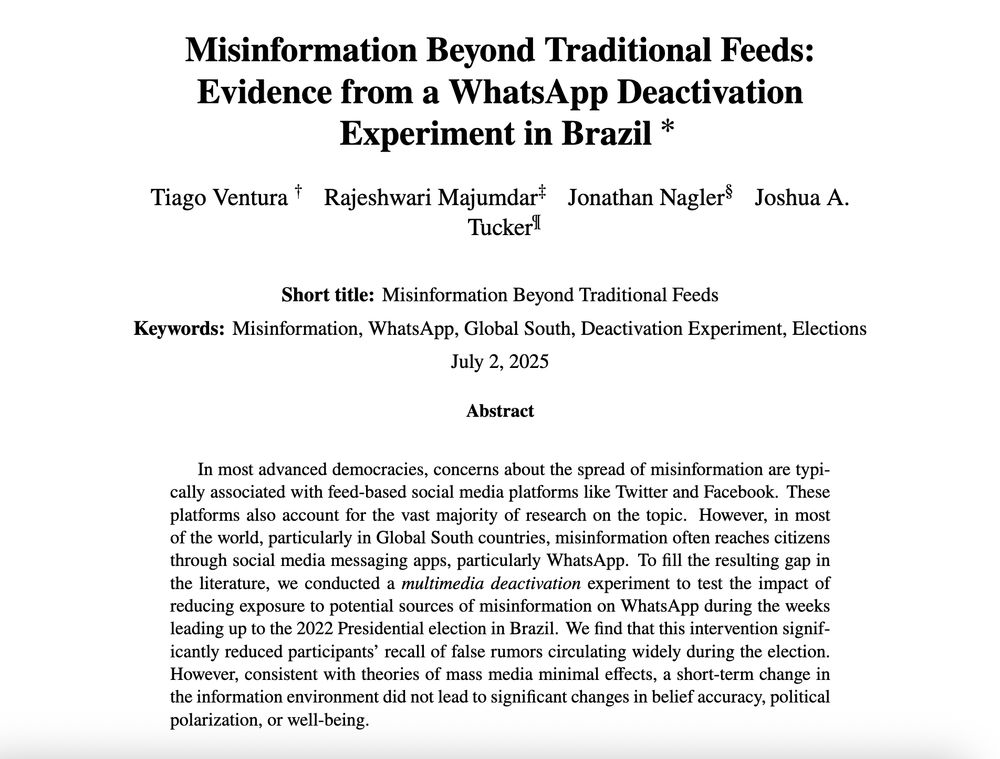
July 17, 2025 at 3:27 PM
🚨 Paper now as "just accepted" at @The_JOP. We ran the first WhatsApp deactivation experiment focused on multimedia content ahead of the 2022 election in Brazil. We find a reduction in users' recall of false rumors -- and, to a smaller degree, of true news. Null effects on attitudes. Full thread ⬇️
Reposted by NYU's Center for Social Media and Politics
In addition to the original UK results, we have now ***replicated*** this (TWICE) in the US.
The main findings hold strong: information diets are a lot more diverse in attention than in engagement.
New version here: osf.io/preprints/os...
The main findings hold strong: information diets are a lot more diverse in attention than in engagement.
New version here: osf.io/preprints/os...

July 22, 2025 at 8:27 AM
In addition to the original UK results, we have now ***replicated*** this (TWICE) in the US.
The main findings hold strong: information diets are a lot more diverse in attention than in engagement.
New version here: osf.io/preprints/os...
The main findings hold strong: information diets are a lot more diverse in attention than in engagement.
New version here: osf.io/preprints/os...
In the Global South, WhatsApp is more popular than X or Facebook.
New in @The_JOP, we ran a WhatsApp deactivation experiment during Brazil’s 2022 election to explore how the app facilitates the spread of misinformation and affects voters’ attitudes.
www.journals.uchicago.edu/doi/abs/10.1...
New in @The_JOP, we ran a WhatsApp deactivation experiment during Brazil’s 2022 election to explore how the app facilitates the spread of misinformation and affects voters’ attitudes.
www.journals.uchicago.edu/doi/abs/10.1...

July 17, 2025 at 2:51 PM
In the Global South, WhatsApp is more popular than X or Facebook.
New in @The_JOP, we ran a WhatsApp deactivation experiment during Brazil’s 2022 election to explore how the app facilitates the spread of misinformation and affects voters’ attitudes.
www.journals.uchicago.edu/doi/abs/10.1...
New in @The_JOP, we ran a WhatsApp deactivation experiment during Brazil’s 2022 election to explore how the app facilitates the spread of misinformation and affects voters’ attitudes.
www.journals.uchicago.edu/doi/abs/10.1...
Reposted by NYU's Center for Social Media and Politics
I am thrilled to share a new article in Sociological Methods & Research, “Quantifying Narrative Similarity Across Languages”. My co-first author Sol Messing and our collaborators developed a new approach to measuring “narrative similarity” between texts: journals.sagepub.com/doi/10.1177/...
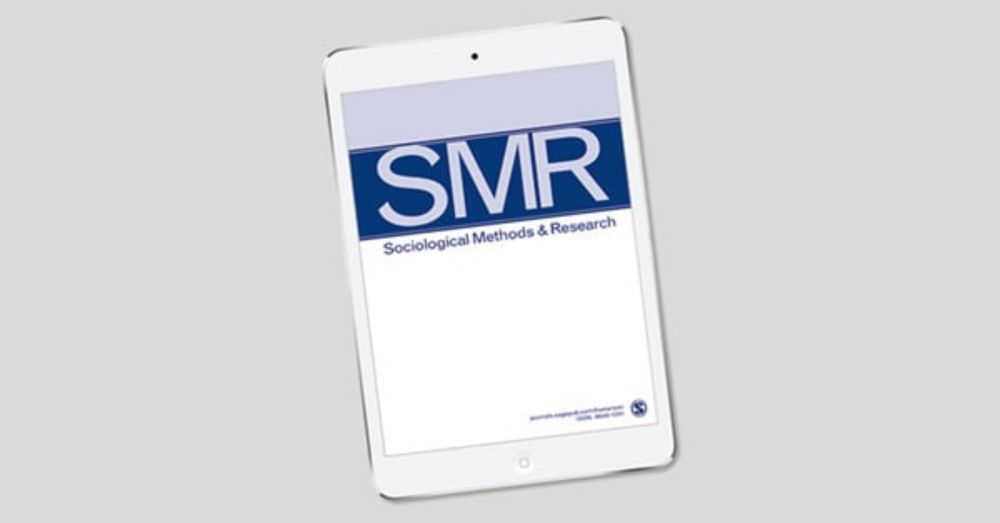
Quantifying Narrative Similarity Across Languages - Hannah Waight, Solomon Messing, Anton Shirikov, Margaret E. Roberts, Jonathan Nagler, Jason Greenfield, Megan A. Brown, Kevin Aslett, Joshua A. Tuck...
How can one understand the spread of ideas across text data? This is a key measurement problem in sociological inquiry, from the study of how interest groups sh...
journals.sagepub.com
June 18, 2025 at 3:56 PM
I am thrilled to share a new article in Sociological Methods & Research, “Quantifying Narrative Similarity Across Languages”. My co-first author Sol Messing and our collaborators developed a new approach to measuring “narrative similarity” between texts: journals.sagepub.com/doi/10.1177/...
Reposted by NYU's Center for Social Media and Politics
🚨New Publication @thejop.bsky.social We study who sets the issue agenda of state policymakers in the US. We find a mixed picture: they respond to shifts in attention by members of Congress, but also to the constituents in their states, particularly their own party supporters.
Amid growing DC gridlock, state legislatures play a vital role in shaping policy. But how do state lawmakers decide which issues deserve their attention? Our new @thejop.bsky.social paper is the first large-scale multi-state analysis exploring this question
www.journals.uchicago.edu/doi/10.1086/...
www.journals.uchicago.edu/doi/10.1086/...
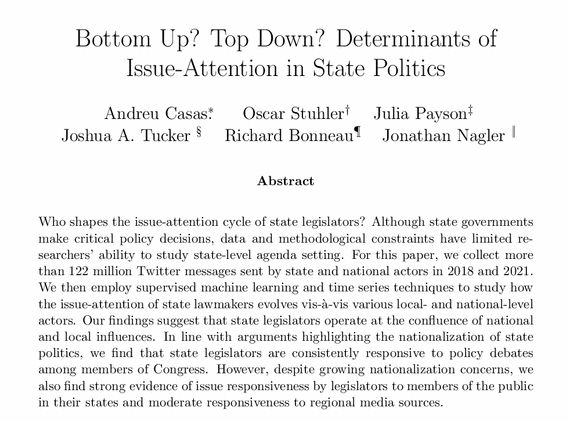
April 23, 2025 at 10:00 AM
🚨New Publication @thejop.bsky.social We study who sets the issue agenda of state policymakers in the US. We find a mixed picture: they respond to shifts in attention by members of Congress, but also to the constituents in their states, particularly their own party supporters.
Reposted by NYU's Center for Social Media and Politics
If your NSF grant has been terminated, please, please report it here:
airtable.com/appGKlSVeXni...
Collecting this information is supremely helpful to organize and facilitate a response.
airtable.com/appGKlSVeXni...
Collecting this information is supremely helpful to organize and facilitate a response.
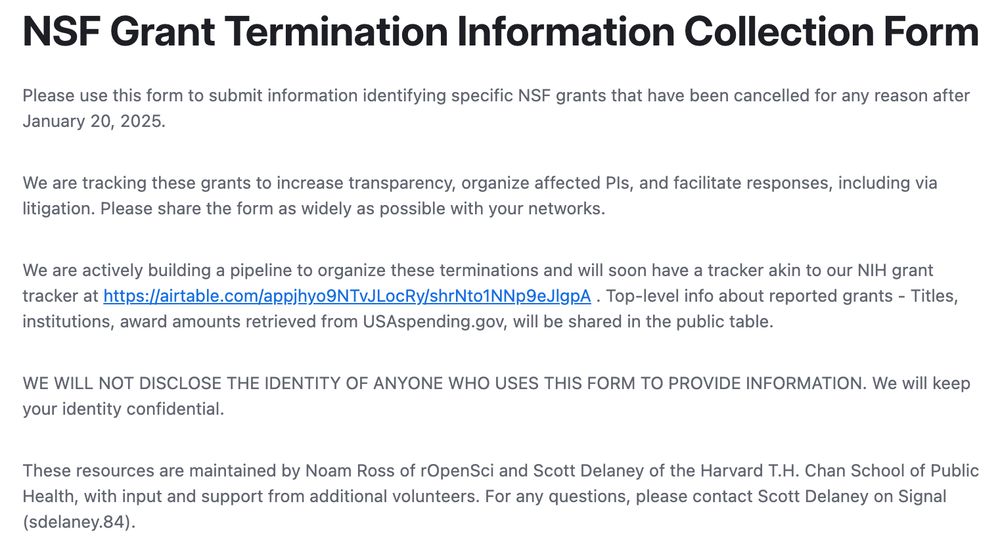
April 21, 2025 at 7:59 PM
If your NSF grant has been terminated, please, please report it here:
airtable.com/appGKlSVeXni...
Collecting this information is supremely helpful to organize and facilitate a response.
airtable.com/appGKlSVeXni...
Collecting this information is supremely helpful to organize and facilitate a response.
Reposted by NYU's Center for Social Media and Politics
🚨 NEW: Crowdsourced database of #NSF grant terminations. 🚨
We've been able to collect info on >110 cancelled grants that were cancelled on Friday. Thanks to all the researchers who reported over the holiday weekend. 🧪 airtable.com/appGKlSVeXni...
We've been able to collect info on >110 cancelled grants that were cancelled on Friday. Thanks to all the researchers who reported over the holiday weekend. 🧪 airtable.com/appGKlSVeXni...

Airtable | Everyone's app platform
Airtable is a low-code platform for building collaborative apps. Customize your workflow, collaborate, and achieve ambitious outcomes. Get started for free.
airtable.com
April 21, 2025 at 7:57 PM
🚨 NEW: Crowdsourced database of #NSF grant terminations. 🚨
We've been able to collect info on >110 cancelled grants that were cancelled on Friday. Thanks to all the researchers who reported over the holiday weekend. 🧪 airtable.com/appGKlSVeXni...
We've been able to collect info on >110 cancelled grants that were cancelled on Friday. Thanks to all the researchers who reported over the holiday weekend. 🧪 airtable.com/appGKlSVeXni...
Reposted by NYU's Center for Social Media and Politics
New paper out in @thejop.bsky.social with my colleagues at @csmapnyu.org . Substantive findings are summarized in the thread below.
Of interest to a broader sociological audience: we show how to measure discursive influence between different groups.
Of interest to a broader sociological audience: we show how to measure discursive influence between different groups.
Amid growing DC gridlock, state legislatures play a vital role in shaping policy. But how do state lawmakers decide which issues deserve their attention? Our new @thejop.bsky.social paper is the first large-scale multi-state analysis exploring this question
www.journals.uchicago.edu/doi/10.1086/...
www.journals.uchicago.edu/doi/10.1086/...

April 22, 2025 at 10:27 AM
New paper out in @thejop.bsky.social with my colleagues at @csmapnyu.org . Substantive findings are summarized in the thread below.
Of interest to a broader sociological audience: we show how to measure discursive influence between different groups.
Of interest to a broader sociological audience: we show how to measure discursive influence between different groups.
Amid growing DC gridlock, state legislatures play a vital role in shaping policy. But how do state lawmakers decide which issues deserve their attention? Our new @thejop.bsky.social paper is the first large-scale multi-state analysis exploring this question
www.journals.uchicago.edu/doi/10.1086/...
www.journals.uchicago.edu/doi/10.1086/...

April 21, 2025 at 7:12 PM
Amid growing DC gridlock, state legislatures play a vital role in shaping policy. But how do state lawmakers decide which issues deserve their attention? Our new @thejop.bsky.social paper is the first large-scale multi-state analysis exploring this question
www.journals.uchicago.edu/doi/10.1086/...
www.journals.uchicago.edu/doi/10.1086/...
Reposted by NYU's Center for Social Media and Politics
Here's a copy of an NSF grant termination notice that went out today. "NSF is issuing this termination to protect the interests of the government pursuant...on the basis that they no longer effectuate the program goals or agency priorities." Not subject to appeal. #HigherEd #AcademicSky
![Text of email: Dear [redacted],
The U.S. National Science Foundation (NSF) has undertaken a review of its award portfolio. Each award was carefully and individually reviewed, and the agency has determined that termination of certain awards is necessary because they are not in alignment with current NSF priorities. Effective immediately, the following are terminated: [redacted]
NSF is issuing this termination to protect the interests of the government pursuant to NSF Grant General Conditions (GC-1) term and condition entitled Termination and Enforcement; on the basis that they no longer effectuate the program goals or agency priorities. This is the final agency decision and not subject to appeal. Costs incurred as a result of this termination may be reimbursed, provided such costs would otherwise be allowable under the terms of the award and the governing cost principles. In accordance with your award terms and conditions, you have 30 days from the termination date to furnish a summary of progress under the award and an itemized accounting of allowable costs incurred prior to the termination date.
Sincerely, [redacted] Division Director
Office of Budget Finance and Award Management (BFA)
Division of Grants and Agreements (DGA)](https://cdn.bsky.app/img/feed_thumbnail/plain/did:plc:l3jbgdl7a5rtsfyrgjw7spkz/bafkreif3rmsl6htpibxg3loqsuazljaekd636abaavvfm4nkjplr5e6itu@jpeg)
April 18, 2025 at 11:19 PM
Here's a copy of an NSF grant termination notice that went out today. "NSF is issuing this termination to protect the interests of the government pursuant...on the basis that they no longer effectuate the program goals or agency priorities." Not subject to appeal. #HigherEd #AcademicSky
Reposted by NYU's Center for Social Media and Politics
Friday Night Massacre of accurate information.
A devastating day for the USA as tens of millions of dollars of grants seeking to combat the spread of false information were terminated. We have a federal govenrment that does not consider the verifiable truth a priority. www.nsf.gov/updates-on-p...
A devastating day for the USA as tens of millions of dollars of grants seeking to combat the spread of false information were terminated. We have a federal govenrment that does not consider the verifiable truth a priority. www.nsf.gov/updates-on-p...

Updates on NSF Priorities
www.nsf.gov
April 19, 2025 at 1:27 PM
Friday Night Massacre of accurate information.
A devastating day for the USA as tens of millions of dollars of grants seeking to combat the spread of false information were terminated. We have a federal govenrment that does not consider the verifiable truth a priority. www.nsf.gov/updates-on-p...
A devastating day for the USA as tens of millions of dollars of grants seeking to combat the spread of false information were terminated. We have a federal govenrment that does not consider the verifiable truth a priority. www.nsf.gov/updates-on-p...
Do age verification laws change online behavior? @zevesanderson.com joined @jerusalem.bsky.social to talk about the importance of research for measuring policy impacts for The Atlantic's Good on Paper podcast.
www.theatlantic.com/podcasts/arc...
www.theatlantic.com/podcasts/arc...

Would You Give PornHub Your ID?
What happened when Louisiana tried to stop kids from watching porn
www.theatlantic.com
April 15, 2025 at 6:23 PM
Do age verification laws change online behavior? @zevesanderson.com joined @jerusalem.bsky.social to talk about the importance of research for measuring policy impacts for The Atlantic's Good on Paper podcast.
www.theatlantic.com/podcasts/arc...
www.theatlantic.com/podcasts/arc...
Reposted by NYU's Center for Social Media and Politics
Experts are far more bullish about the potential of AI than the American public is. 56% expect a positive impact (vs. 17% of the public). 76% expect it to benefit them personally (vs. 24% of the public). Also much more positive on specific AI applications: www.pewresearch.org/internet/202...



April 8, 2025 at 11:49 AM
Experts are far more bullish about the potential of AI than the American public is. 56% expect a positive impact (vs. 17% of the public). 76% expect it to benefit them personally (vs. 24% of the public). Also much more positive on specific AI applications: www.pewresearch.org/internet/202...
🚨 Job Alert! 🚨
Come join our team studying the impact of digital media on democracy!
We're hiring a Technical Lead - Research Engineering to help us build and maintain the robust data infrastructure and custom tools that power our research.
More info + apply:
apply.interfolio.com/165833
Come join our team studying the impact of digital media on democracy!
We're hiring a Technical Lead - Research Engineering to help us build and maintain the robust data infrastructure and custom tools that power our research.
More info + apply:
apply.interfolio.com/165833


April 7, 2025 at 6:12 PM
🚨 Job Alert! 🚨
Come join our team studying the impact of digital media on democracy!
We're hiring a Technical Lead - Research Engineering to help us build and maintain the robust data infrastructure and custom tools that power our research.
More info + apply:
apply.interfolio.com/165833
Come join our team studying the impact of digital media on democracy!
We're hiring a Technical Lead - Research Engineering to help us build and maintain the robust data infrastructure and custom tools that power our research.
More info + apply:
apply.interfolio.com/165833
Reposted by NYU's Center for Social Media and Politics
ELB Podcast 6:7: Combatting False Election Information: Lessons from 2024 and a Look to the Future (Marwick, Starbird, Tucker) electionlawblog.org?p=149336

ELB Podcast 6:7: Combatting False Election Information: Lessons from 2024 and a Look to the Future (Marwick, Starbird, Tucker) #ELB
Season 6, Episode 7 of the ELB Podcast: How did campaigning and false information in campaigns change in the 2024 elections? What role did platform content moderation play in 2024? Is generative AI go...
electionlawblog.org
April 6, 2025 at 2:53 PM
ELB Podcast 6:7: Combatting False Election Information: Lessons from 2024 and a Look to the Future (Marwick, Starbird, Tucker) electionlawblog.org?p=149336
Users always respond to the incentives of a given social media platform. On X, the new incentive if you want to go viral is to just say something Elon Musk will like, @zevesanderson.com tells @politifact.bsky.social.
Donald Trump shared its post of AI-generated images of Taylor Swift. Elon Musk has amplified its posts to his 218 million followers. Top Trump administration officials follow it.
Here’s what we know about the anonymous “Amuse” X account followed some of the country’s most powerful decision-makers.🧵
Here’s what we know about the anonymous “Amuse” X account followed some of the country’s most powerful decision-makers.🧵

March 31, 2025 at 7:53 PM
Users always respond to the incentives of a given social media platform. On X, the new incentive if you want to go viral is to just say something Elon Musk will like, @zevesanderson.com tells @politifact.bsky.social.
Reposted by NYU's Center for Social Media and Politics
📄NEW PAPER📄
Ever wondered content people actually pay *attention* to online? Our new research reveals that you likely pay attention to far more varied political content than your likes and shares suggest
Ever wondered content people actually pay *attention* to online? Our new research reveals that you likely pay attention to far more varied political content than your likes and shares suggest
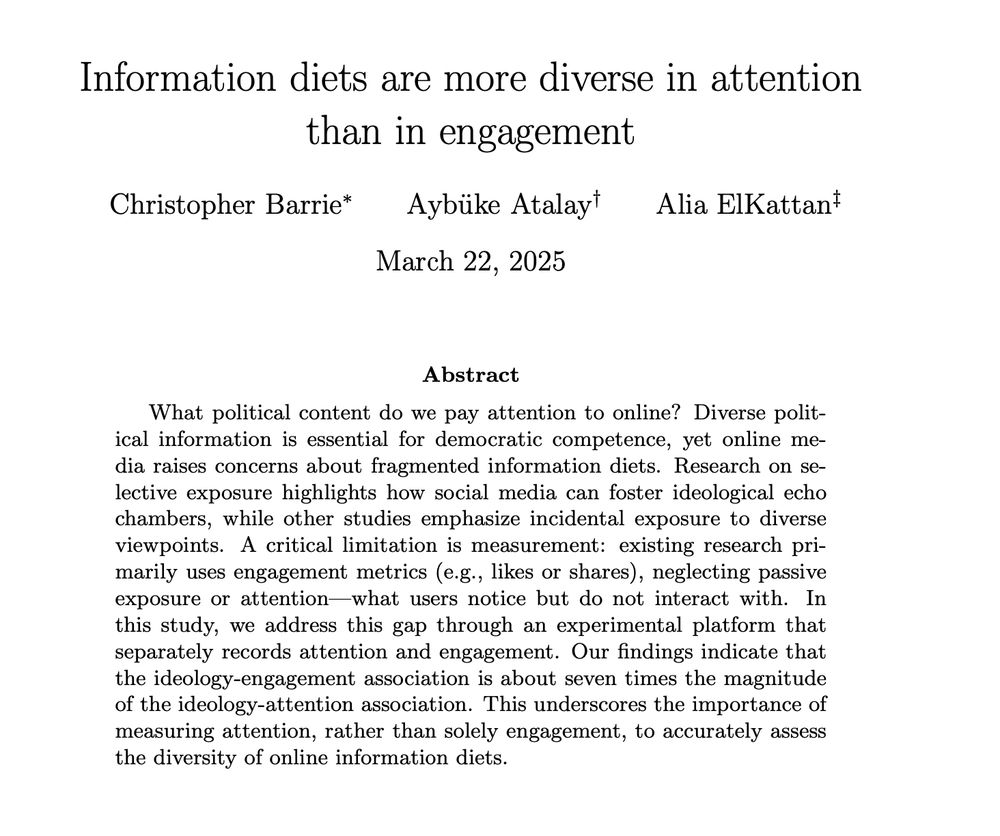
March 25, 2025 at 12:04 PM
📄NEW PAPER📄
Ever wondered content people actually pay *attention* to online? Our new research reveals that you likely pay attention to far more varied political content than your likes and shares suggest
Ever wondered content people actually pay *attention* to online? Our new research reveals that you likely pay attention to far more varied political content than your likes and shares suggest
Reposted by NYU's Center for Social Media and Politics
So excited to finally see this out! It was the first paper I started during my postdoc at @csmapnyu.org
It's well known that politicians take more extreme positions during primaries. In @electoralstudies.bsky.social, we find this shift is much more likely when incumbents in safe seats face a well-funded primary challenger.
🧵👇
authors.elsevier.com/a/1kn5KxRaZn...
🧵👇
authors.elsevier.com/a/1kn5KxRaZn...
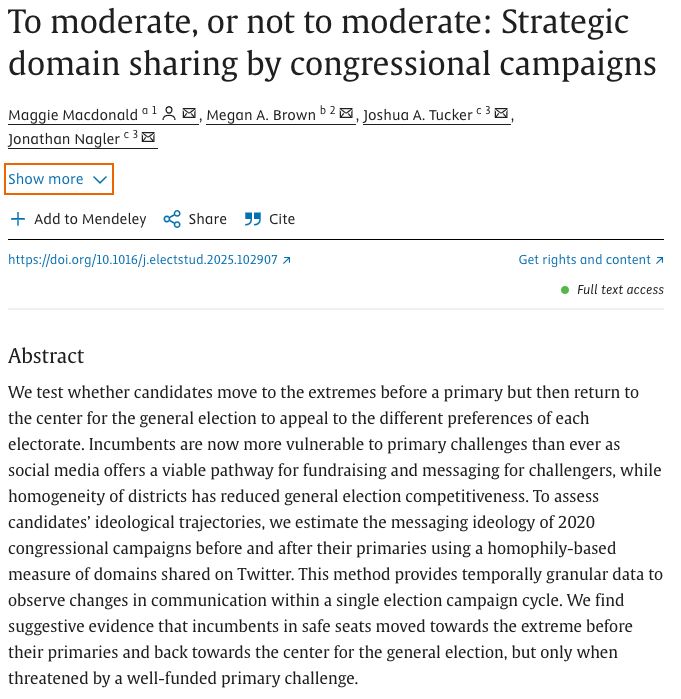
March 17, 2025 at 3:30 PM
So excited to finally see this out! It was the first paper I started during my postdoc at @csmapnyu.org

